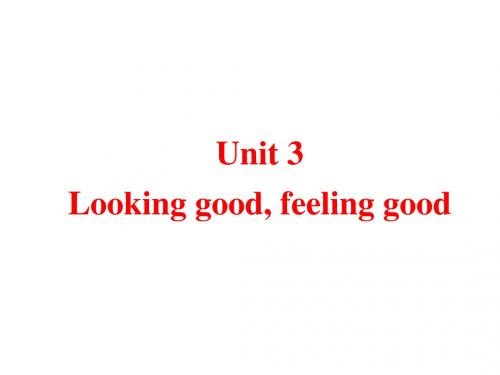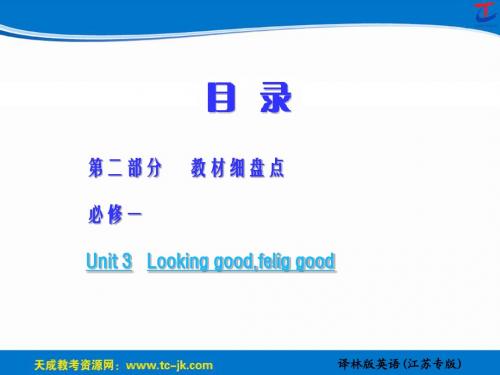江苏省高淳高级中学高中英语必修一:Unit 3 Looking good feeling good Grammar导学案 Word版缺答案
- 格式:doc
- 大小:36.00 KB
- 文档页数:6




高一英语必修一 Unit 3 Looking good, feeling good1. work out vi & vt.[口]练习,锻炼。
Whatever the weather is like, my sister works out in the gym every day.计算出,解决问题 Can you work out how much money it will cost? 详细拟定(计划,方案等)He worked out all the details of the plan.巧妙地处理 I hope the new project will work out well.(结果)成功 How did his suggestions work out?2.stay 保持,是系动词,后接形容词,副词,介词。
stay up 不睡觉、熬夜stay in 呆在家里stay still 静止不动3. figuren.体态,体型 She has an attractive figure.人物,名人 He has become a figure known to everyone. 数字 Add up these figures.画像,肖像 The stone figures in the temple look frightening. 【短语】 figure out = ①come to understand by thinking 弄明白,理解= ② calculate 计算出have/ keep a good figure 拥有/保持好身材be good / poor at figures 擅长/不擅长计算4. weight n (U) 重量,体重lose weight put on weight = gain weightwatch one’s weight 注意体重buy or sell sth. by weight按某物的重量买卖 in weight 在重量方面be of a weight=be of the same weight 一样重 (be of an age=be of the same age 年龄一样大)提问“……多重,重量多少”时用what, 不用how much. 例What’s your weight?5. ashamed adj. 惭愧的,羞愧的6.priceless=invaluable adj 贵重的无价的I think your advice priceless。

牛津译林版必修一Unit3Lookinggood,feelinggoodModule 1Unit 3 Looking good, feeling good新课标单词gym n.健身房;体育馆work out 锻炼stay vi.保持slim adj.苗条的,纤细的figure n. 体形,身材weight n.体重;重量;杠铃片ashamed adj.惭愧的,羞愧的since conj.因为;既然weight-loss adj.减肥的,瘦身的exercise vi.锻炼,运动work vi.起作用,有效果,奏效recover vi.痊愈,恢复健康vt.重新获得,恢复failure n.衰退,衰竭;故障,失灵contain vt.包含;容纳chemical adj./ n. 化学物质;化学药品operation n.手术exact adj.精确的,准确的match n.相配的人或物,配对物vt.&vi.匹配,相称follow vt.遵循,遵守,依照advice n.建议,忠告seldom adv.很少,不常,难得damage vt.&n.损害,伤害attractive adj.有吸引力的,有魅力的touching adj.动人的,感人的stranger n.陌生人embarrassed adj.尴尬的,不好意思的,难为情的pressure n.压力actress n.女演员overweight adj.肥胖的,体重超标的diet n.节食;日常饮食vi.节食,控制饮食properly adv.适当地,合适地,合理地skinny adj.极瘦的,皮包骨的lift vt.举起consider vt.考虑effect n.效果,作用;影响side effect 副作用fall out (头发等)脱落affect vt.影响sportsman n.运动员achievement n.成就risk n.&vt.冒险put on weight 体重增加recognize vt.认出,识别;认可,公认energy n.能量regularly adv.定期地,有规律地,经常along with 连同……,随同……regular adj.定期的,有规律的,经常的in the long term从长远角度看yet adv.然而,可是control vt.&n.控制system n.系统skin n.皮肤count vi.算数,有效relaxed adj.放松的,轻松的ability n.能力concentrate vt.&vi.集中(注意力、思想等);全神贯注amount n.量,数量loss n.丢失,损失suggestion n.建议in no time 立刻,很快课文出现短语1. feel good2. put on weight3. discuss the questions below4. be dying to do sth5. in no time6. make sb look slimmer7. get enough sleep8. stay healthy9. work out10. do exercise11. cause sb to do sth12. worry about13. hear from sb14. used to do sty15. three times a day16. not…any more17. another way to do sth18. a slim figure 19. lose weight20. be ashamed of21. act in a TV play22. at least23. in the last two months24. concentrate on25. go on diets26. change one’s appearance27. keep oneself looking good28. be ashamed of29. side effect30. fall out31. in secret32. follow one’s advice33. as a matter of fact34. along with35. come across36. in the long term一.单词应用根据单词的首字母或汉语意思填写正确单词,注意形式变化。

必修1 Unit3 Looking good, feeling good详细讲义【教学内容与教学要求】一、教学内容:牛津高中英语模块一Unit 3二、教学要求:1.学会谈论有关健康生活的话题。
2.学习英语中标点符号的名称和用法。
3.学习调查、整理、分析信息。
4.缩略和简写。
【知识重点与学习难点】一、重要单词:Guideline, highlight, lifestyle, advertisement, commercial(n), convey, , afford, , offer, yoga, branch, square, shape, figure, trainer, , brief, abbreviation, contraction, symbol, seldom, , proper, energy, count, concentrate, chemical, amount, booklet, survey, conduct, analyze, statistics, questionnaires, permission, give out, create, percentage, level, pin, persuade, omit, skip, virus, remove, item, recommend, mention, summary, conclusion, calorie.二、重点词组:Prompt box提词台, a reminder of提醒某人想起某事的人或事物, call sb names骂人, cheer up高兴起来, closely related紧密相关的, live(lead) a…. life过着….样的生活, , a headache to令人头疼的人或事, along with 一起, in the long term(run)从长远角度看, give up on放弃, a good amount of适量的、许多, in no time很快, give out分发、发出, allow enough time for sb to do…留出充足的时间让某人做某事, skip meals不吃饭, membership fee会员费,三、【标点符号的英文名称和用法】punctuations: comma逗号, full stop/period句号, question mark问号, exclamation mark感叹号, colon冒号, semi-colon分号, quotation marks引号, apostrophe省略符号, hyphen连字符号, dash破折号, under bar下划线。
Grammar:1.Non-restrictive attributive clauses非限制性定语从句Practice: Finish the attributive clauses below:1. The lesson __________ we studied yesterday was hard to understand.2. You can take any book ____ interests you best.3. People like to live in a place _____ there’s fresh air and little noise.4. The girl __________ you saw at the meeting is a well-known swimmer.5. He is the very worker _____ picture we saw in the newspaper yesterday.6. He was very happy on the day ______________ he entered the university.7. I never really understand the reason ____ he made such a seri ous mistake.8. Don’t read such books ___ you cannot understand.9. Is that the student _______ you lent your dictionary?10. Is this the new novel __________ you have talked so much?11. The little hero, ___ has given his life for his country, will always live in the heart of the people.(which / that; that; where; who(m) / that; whose; when / on which; why; as; to whom; which/ that; who)Question:What’s the difference between N o. 10 and No. 11?(No. 10 is a restrictive clause while No. 11 with a comma is a non-restrictive clause.)Explanation:1.定语从句(attributive clauses)通常由关系代词或关系副词引出。
常见的关系代词有: which(指物), that(既可指人又可指物), who(指人,在定语从句中作主语或宾语), whom(指人,在定语从句中作宾语),whose(指人或物,作定语)等。
关系副词有: when(指时间),where(指地点),why(指原因)等。
2. 定语从句分为限制性定语从句(restrictive )和非限制性定语从句(non-restrictive)两种。
限制性定语从句紧跟先行词,与先行词之间一般不加逗号;非限制性定语从句与主句之间通常用逗号分开。
Practice:Try to find the attributive clauses in the Reading section on page 42-43 and tell their functions.restrictive attributive clauses:1. They contain a harmful chemical that caused my liver to fail.2. We shouldn’t be ashamed of the way we look, should we?3. This is really a touching story—a stranger who donated part of his liver to a girl he doesn’t even know!non-restrictive attributive clauses:1. My mother, whom you met last year, keeps telling me not to take them because they are dangerous.2. I’m taking weight-loss pills called Fat-Less, which are quite popular among young women here.3. Then the doctor found someone in your country, whose name is Li Dong, was an exact match for me.4. It’s the same in China—many people, some of whom are not overweight at all, are always going on diet or taking weight-loss pills, which are often dangerous.Differences:Example 11. His father, who works in Beijing, came back yesterday.2. Shanghai, which is in East China, is developing rapidly.Conclusion:当先行词是地名、人名、世界上独一无二的事物或家庭成员时,通常只用非限制性定语从句修饰。
Example 21. I have a sister who / that works in a hospital. 我有一位在医院工作的姐姐。
(不只一位姐姐)2. I have a sister, who works in a hospital. 我有一位姐姐,她在医院工作。
(只有一位姐姐)3. The magazines here which / that have nice pictures in them were written by him. 里面有漂亮图画的那些杂志是他写的。
(杂志有两类)4. The magazines here, which have nice pictures in them, were written by him. 所有的杂志都是他写的, 里面都有漂亮的图画。
(杂志只有一类)Conclusion:1. 限制性定语从句与先行词关系密切, 是先行词不可缺少的部分, 如果去掉它,主句意思往往不明确。
2. 非限制性定语从句是对先行词的补充或说明,去掉它也不会影响主句的意思。
Example 31. This is the house (which/ that )we bought last month. 这是我们上个月买的那幢房子。
2. The house, which we bought last month, is very nice. 这房子很漂亮, 是我们上个月买的。
3. He seems not to have grasped what I meant, which greatly upsets me. 他似乎没领会我的意思, 这使我心烦。
Conclusion:1. 限制性定语从句可以由关系代词、关系副词来引导,关系代词作宾语时可以省略。
2. 非限制性定语从句既可修饰先行词, 又可修饰整个主句, 不可用that引导且关系代词不可以省略。
Practice1. The famous basketball star, ___ comes from America, will visit our school soon.2. In those days, she used to go to Mr black, with _____ she had a wonderful time.3. I bought a car yesterday, _____ cost me a lot.4. Xi’an, ______I visited las t year, is a nice old city.5. He will come to see me next July, _____ he won’t be so busy.6. The school, _____ I once studied, was built thirty years ago.7. John said he’d been working in the office for an hour, _____ was true.8. __ we all know, he is good at English.(who; whom; which; which; when; where; which; As)非限制性定语从句考点归纳:1. as 和which引导非限制性定语从句, 代替整个主句。
1. As everyone knows, China is a country with a long history.众所周知,中国是一个历史悠久的国家。
2. She is a teacher, as is clear from her manner.她是个教师, 这一点从她的举止可以清楚地看出。
3. He missed the show, which was really a great pity. 他错过了演出,这真是很大的遗憾。
4. He invited me to dinner, which made me very happy. 他请我吃饭,这使我很高兴。
Conclusion:1. as 和which在引导非限制性定语从句时, as和which可代替整个主句,相当于and this 或and that。
这两个关系代词都可指代主句所表达的整个意思,且在定语从句中都可以作主语和宾语。
2. as和which引导非限制性定语从句的不同之处在于:(1) as 引导的定语从句可置于句首,而which引导的定语从句不可放在句首。
(2) as 代表前面的整个主句并在从句中作主语时, 常带有“正如”的意思,往往表示说话人的一种意见和看法。
Practice:1.Alice received an invitation from her boss, ____________ came as a surprise.2.The weather turned out to be very good, ___________ was more than we couldexpect.3.__________ is expected, the England team won the football match.4.It rained hard yesterday, __________ prevented me from going to the park.5.__________ we can see, the smoke came from the little dustbin.(which; which; As; which; As)II. all / some/ of + whom / which引导非限制性定语从句1.He has told us many stories, all of which are about the famous Long Match.2.The students of Class 1, some of whom came from Japan, went camping yesterday. Conclusion:在非限制性定语从句中,不定代词 all/ some/ one/ both/ neither/ none/ any/ either/ any 等可与 of 构成介词词组修饰限制先行词,此时先行词在其后的定语从句中作介词的宾语,关系代词不可用that。